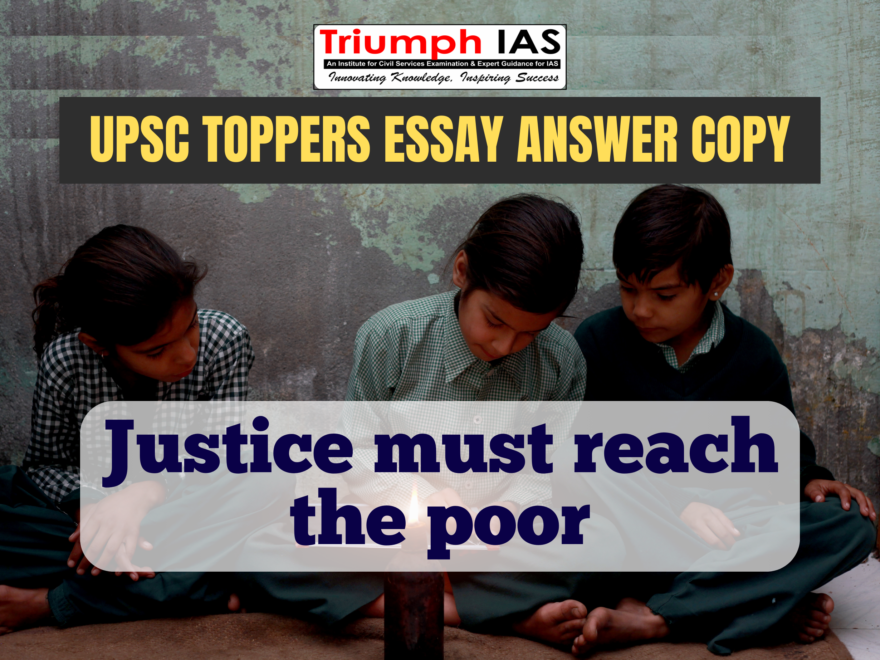IAS Aayush Gupta

Essay Topic:
Justice must reach the poor
(Relevant for Essay Writing for UPSC Civil Services Examination)
The UPSC Mains Exam consists of total 9 papers, including an essay paper, which is crucial for determining the final result and ranking of candidates. Unlike Optional Subjects, the essay paper requires depth study, making it a significant factor in the selection process. The Essay Paper in the IAS Mains Exam comprises two sections, A and B, each containing four topics worth 125 marks, totaling 250 marks (125×2). Candidates are required to choose one topic from each section and write an essay of 1,000 to 2,000 words within the allocated three-hour time frame. When it comes to writing an essay for the UPSC exam, it should be well-structured, easy to understand, comprehensive, succinct, composite, definite, informative, and logical. To effectively prepare for the essay paper, practicing Essay Test Series and seeking Essay Mentorship are crucial. Many Toppers, including RAJAT YADAV, 141 Marks (Highest marks in Essay in CSE 2022), have followed 𝑽𝙞𝒌𝙖𝒔𝙝 𝙍𝒂𝙣𝒋𝙖𝒏 𝑺𝙞𝒓’𝒔 approach and wisdom for writing the essay.
Justice must reach the poorRam Kumar, a daily wager, visits the local PDS shop to get his quota of ration. He overhears the Sarpanch talking about how India has now become the 3rd largest economy in the world. He wonders to himself what would it mean for him? Would he get adequate employment? Would his daughters get a good education? Would his home finally get basic facilities like water? In other words – will the social contract be redeemed per Ram Kumar – will he get his due? If justice is to mean anything, it must be universal. Incomplete justice is an oxymoron- it necessarily implies injustice to some. Similarly, our constitutional goal of justice – social, economic, and political eloquently set forth in our preamble – if it is to mean anything at all, it must reach the poor like Ram Kumar. A CONSTITUTIONAL VALUE Justice defined in the simplest possible terms – evading all philosophical definitions means that ‘everyone must be treated fairly’. Fairness is the value underlying justice. An action to be just should ipso facto be fair. Shah Rukh Khan once in an interview remarked “Khali Pet Khwab Nahi Dekhe Jaate” (you cannot dream on an empty stomach). Thus justice likewise has many dimensions. It implies an equal and fair representation in the political community – not based on majoritarianism but on a shared consensus of values (constitutional morality). Everybody gets a fair chance in the economic life of the country – where effort, talent, and hard work are rewarded. A society where there are no structural impediments towards realizing the full human potential. These are the basis of justice. However, throughout history, we see that the most in need of justice are often the ones most marginalized and denied access to it. From the slaves of ancient Rome to the untouchables in India. From poor peasants living under the ‘divine’ monarchies of China, India, or Japan or their more human counterparts in Europe to modern-day wage laborers -> The poor have most often been denied justice. Nearly 200 years after Karl Marx insightfully said, “the history of all mankind hitherto, is the history of class struggle” – we need to ask ourselves, has justice really reached the poor? INJUSTICES FACED BY THE POOR. The word Injustice readily brings to mind a news report -> a Dalit settlement was burned down why? Because a Dalit man had married an upper-caste woman. To think that such an incident could happen in a modern democratic society. It speaks volumes about the kind of Social Justice promised by our preamble, the poor have access to today. Caste Injustice affects those at the bottom of the ladder the most – they are the most hopeless victims of the most form of caste oppression. While the relatively well-off suffer too – but nothing compared to the plight of the downtrodden. To top it off – the affirmative action programs meant to improve the situation are cornered by the affluent among them. Women are discriminated against, poor women are doubly discriminated against. While the struggle against patriarchy is needed on all fronts – we need more representation from women at the very bottom of the pyramid. Their issues demand an ear too. When we look at social indicators like health and education outcomes – the poor show a strong correlation with poor outcomes. The ones most denied access to basic conditions of life – like which a person needs to survive – are the people who most need it to escape the vicious clutches of poverty. In the recently released global hunger Index – India ranked 103rd – comparable to sub-Saharan Africa. Is this the justice our citizens deserve- not enough food to lead a healthy life? Even politically – the poor are often the least heard and represented group. The amount of expenses it takes today to contest elections is in figures of crores (ironically the limits on spending are around Rs 70 lakh). How can a person who cannot afford two square meals a day ever hope to compete on an equal sphere? Democracy should, theoretically, give voice to the poor – after all, everyone has a vote and a voice. However, we must heed Dr. Ambedkar’s warning “Democracy in India is a top cover over a structure which is essentially undemocratic” This pact is reflected in practice – the poor are the most talked of but least impacted group. Despite 70 years of working towards economic redistribution and ‘Garibi Hatao” – it is still firmly entrenched in our society. Our politicians taking a leaf of the book of the colonialists – divide and rule over the poor. There are even strong correlations between poverty and minorities. This correlation is again strengthened by their underrepresentation at the political level. Economically today we have become a highly unequal society. According to a recent report by Oxfam – the top 1% of Indians today own 70% of the Nation’s wealth. Is then the economic justice that our founding fathers envisaged for the poor of our country? The sharp inequality is not the result of differences in talents or abilities – but because of structural impediments in our socio-economic system. This is what makes such staggering inequality unjust. We need to have a level playing field – so that all may compete equally. A TRYST WITH DESTINY. We need to ensure that the tryst with destiny – is fair to all, is redeemed by all – not just a few at the top. Many lessons can be drawn from around the world. Norway today might be the most equal country on earth. While poverty exists – its poor do not worry about going homeless, without healthcare, without a quality education because they do not have access to finances. Thus we need to ensure robust social security to ensure that the marginalized could finally live a life of dignity and freedom. ‘Education is the light which will chase away the darkness of poverty and exclusion’ we should invest in the most precious resource this country has – its citizens. The example of South Korea offers ample evidence of how a country can rapidly lift people out of poverty through investments in education. It neither had any natural resources, nor a favorable external environment. Yet it has emerged as a developed economy due to its investments in Education. We also must ensure that the economic system works to the benefit of everyone – while ‘to each according to need, from each according to ability’ may sound utopian, we can at least ensure a just distribution of benefits arising out of economic growth. It entails investing the most in rural infrastructure and in Agriculture where more than half our workforce is engaged. Our political Institutions also must empower those at the bottom – for a government exists for the interests of the governed. Women representation can form a necessary first step towards building a more inclusive society. A rule like Kenya’s Constitution where at least 1/3rd representation in all institutions is mandatory can work wonders – across polity, society, education & healthcare. Justice goes much beyond mere access to courts and enforcing rights in a court of law – that itself is a necessary condition of Rule of law but not sufficient to ensure the vision our great founding fathers had for the kind of country that we were to be. It seems apt to conclude with Mahatma Gandhi’s mantra – to judge the ‘justness’ of our actions- “whenever in doubt, think of the most poor man you have come across. Then think of the impact your decision would have upon this man. Will it give him a better life?” only when our action would benefit people like Ram Kumar – can they be called just. |

Why Vikash Ranjan’s foundation Classes for Essay?
Proper guidance and assistance are required to learn the skill of writing essay topics in CSE examination. VIKASH RANJAN SIR at TRIUMPH IAS guides students according to the Recent Trends of UPSC, making him the Best Essay Teacher for Essay writing UPSC.
At Triumph IAS, the Best Essay Writing Coaching platform, we not only provide the best study material and applied classes of Essay for IAS but also conduct regular assignments and class tests to assess candidates’ writing skills and understanding of the subject.
Choose The Best Essay Writing Teacher for IAS Preparation and Know our Approach for Essay?
- The Programme is Planned & Executed in a Way that You Write a good Essay for obtaining Effective Score of 140 Plus.
- In this programme we provide Classes on
- How to INTRODUCE The Topic in Context of the THEME of the Essay
- How to Elaborate & Explain the Topic-Theme on Temporal Scale & Sectoral Scale as well as Intellectual Scale in the MAIN BODY of the Essay.
- How to Sum up the Topic in CONCLUSION in Context of the Essay Topic Theme.
- ︎We will Teach You How to use the Knowledge Matrix of General Studies & Optional to write a Good Essay more Logically and Coherently.
- After the Classes You have to “Write to Learn & Learn to Score” .This means You have to Write the Essay Test Papers & Learn from the Feedback & Discussions.
Why Essay is Important and What We Offer in “Essay Test Series”?
- Triumph’s Essay Upgradation Test Series (Under Personal Guidance of Vikash Ranjan Sir) doesn’t only focus on improving student’s linguistic skills but also focus on improving student’s ability to comprehend the topic-sentence (subject) recall & relate the facts, concepts, propose thesis-statements, and logically assimilate the ideas & counter ideas with clarity in expression on temporal & Sectoral Scales of knowledge.
- Further students are provided one-on-one INTERACTION* Session with Vikash Ranjan Sir. Students get personal feedback on their strength and weaknesses, regarding what is ‘good about their essay and what more should be done to make it a better one’ by Vikash Ranjan Sir.
Why to take up this “Essay Test Series and Foundation” Course?
- Essay is Low hanging Fruit. Marks in Essay is Effectively Contributing in Final Selection in New Pattern of Mains Exam. With a Well Developed ‘Knowledge Matrix and Rigorous Practice’, One can Score up to 160 + in Essay. So IAS Aspirants should never Ignore Essay Preparation
- Inculcating Writing Competency in Essay for IAS, which is Different from Essay in English, Essay in School and College.
Follow us :
🔎 https://www.instagram.com/triumphias
🔎https://www.youtube.com/c/TriumphIAS
🔎https://t.me/VikashRanjanSociology
Find More Blogs…
keywords: Justice must reach the poor, Justice must reach the poor, Justice must reach the poor, Justice must reach the poor, Justice must reach the poor


2 comments